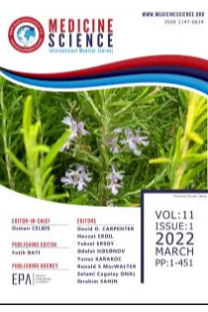Investigation of antidepressant -like effect of pari-flo product on forced swimming test in balb-c mice
___
Moussavi S, Chatterji S, Verdes E, et al. Depression, chronic diseases, and decrements in health: results from the World Health Surveys. Lancet. 2007;370:851-8.Park SW, Kim YK, Lee JG, et al. Antidepressant-like effects of the traditional Chinese medicine kami-shoyo-san in rats. Psychiatry Clin Neurosci. 2007;61:401-6.
Mao QQ, Ip SP, Ko KM, et al. Effects of peony glycosides on mice exposed to chronic unpredictable stress: further evidence for antidepressant-like activity. J Ethnopharmacol. 2009;124:316-20.
Miroddi M, Calapai G, Navarra M, et al. Passiflora incarnata L.: ethnopharmacology, clinical application, safety and evaluation of clinical trials. J Ethnopharmacol. 2013;150:791-804.
ESCOP Monograph. 2nd edition. Thieme Press, New York, 2003;359-64.
Krenn L. Passion Flower Passiflora incarnata L.--a reliable herbal sedative. Wiener medizinische Wochenschrift. 2002;152:404-6.
Grundmann O, Wahling C, Staiger C, et al. Anxiolytic effects of a passion f lower (Passiflora incarnata L.) extract in the elevated plus maze in mice. Pharmazie. 2009;64:63-4.
Barbosa PR, Valvassori SS, Bordignon CL, Jr., et al. The aqueous extracts of Passiflora alata and Passiflora edulis reduce anxiety-related behaviors without affecting memory process in rats. Journal of medicinal food. J Med Food.
de Castro PC, Hoshino A, da Silva JC, et al. Possible anxiolytic effect of two extracts of Passiflora quadrangularis L. in experimental models. Phytother Res. 2007;21:481-4.
Mustafa G, Ansari SH, Bhat ZA, et al. Antianxiety ctivities associated with herbal drugs: A review. Plant Human Health. 2019;3:87-100.
Shelton RC, Sloan Manning J, Barrentine LW, et al. Assessing Effects of l-Methylfolate in Depression Management: Results of a Real-World Patient Experience Trial. Prim Care Companion CNS Disord. 2013;15.
Razak MA, Begum PS, Viswanath B, et al. Multifarious Beneficial Effect of Non-essential Amino Acid, Glycine: A Review. Oxid Med Cell Longev. 2017;2017:1716701.
Maggio M, Ceda GP, Lauretani F, et al. Magnesium and anabolic hormones in older men. Int J Androl. 2011;34:e594-600.
Martone G. Enhancement of recovery from mental illness with l-methylfolate supple-mentation. Perspect Psychiatr Care. 2018;54:331-4.
Jafarpoor N, Abbasi-Maleki S, Asadi-Samani M, et al. Evaluation of antidepressant- like e-ect of hydroalcoholic extract of Passiflora incarnata in animal models of depression in male mice. J HerbMed Pharmacol. 2014;3:415.
Ayres ASFSJ, Araújo LLSd, Soares TC, et al. Comparative central effects of the aqueous leaf extract of two populations of Passiflora edulis. Revista Brasileira de Farmacognosia. 2015;25:499-505.
Porsolt RD, Anton G, Blavet N, et al. Behavioural despair in rats: a new model sensitive to antidepressant treatments. Eur J Pharmacol. 1978;47:379-91.
Petit-Demouliere B, Chenu F, Bourin M. Forced swimming test in mice: a review of anti-depressant activity. Psychopharmacol. 2005;177:245-55.
Castagne V, Moser P, Roux S, et al. Rodent models of depression: forced swim and tail suspension behavioral despair tests in rats and mice. Current protocols in neuroscience. 2011;Chapter 8:Unit 8 10A.
Fiebich BL, Knorle R, Appel K, et al. Pharmacological studies in an herbal drug combi-nation of St. John’s Wort (Hypericum perforatum) and passion f lower (Passiflora incarnata): in vitro and in vivo evidence of synergy between Hypericum and Passiflora in antidepressant pharmacological models. Fitoterapia. 2011;82:474-80.
Bennati E. Quantitative determination of harmane and harmine in the extract of Passi-flora incarnata. Boll Chim Farm.1971;110:664-9.
Callaway JC, McKenna DJ, Grob CS, et al. Pharmacokinetics of Hoasca alkaloids in healthy humans. J Ethnopharmacol. 1999;65:243-56.
Grundmann O, Wang J, McGregor GP, et al. Anxiolytic activity of a phytochemically characterized Passiflora incarnata extract is mediated via the GABAergic system. Planta Med. 2008;74:1769-73.
Lolli LF, Sato CM, Romanini CV, et al. Possible involvement of GABA A-benzodia-zepine receptor in the anxiolytic-like effect induced by Passiflora actinia extracts in mice. J Ethnopharmacol. 2007;111:308-14.
- ISSN: 2147-0634
- Yayın Aralığı: 4
- Başlangıç: 2012
- Yayıncı: Effect Publishing Agency ( EPA )
Evaluating clinical and radiological results following surgical treatment of patella fractures
Sadullah TURHAN, Yetkin SOYUNCU
Ultrasound-guided supracondylar radial nerve block in pain management of distal radius fractures
Assessment of readability level of informed consent forms used in intensive care units
Munise YİLDİZ, Betul KOZANHAN, Mahmut Sami TUTAR
The history and current status of forensic pathology
Mumine GORMEZ, Emine TÜRKMEN ŞAMDANCI
Aortic cross - clamp duration in cardiopulmonary bypass oxidative stress relationship
Ozcan ORSCELİK, Bugra OZKAN, Mert Koray OZCAN
A case with pyoderma gangrenosum, after an abdominal surgery
Gülbahar SARAÇ, Irem MANTAR, Hülya CENK, Mehmet SARAC
Duygu DEMİROZ ASLAN, Muharrem UCAR, Mehmet Ali ERDOGAN, Mukadder SANLİ, Nurcin GULHAS, CEMİL ÇOLAK, Mahmut DURMUS
An investigation of speech sounds of patients applied to orthodontics clinic
